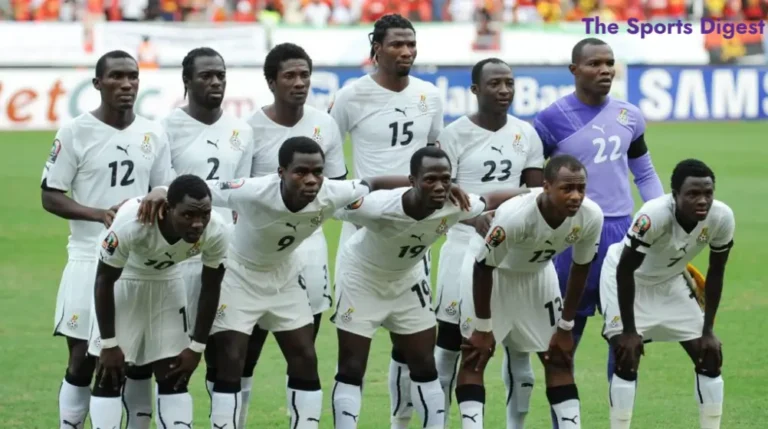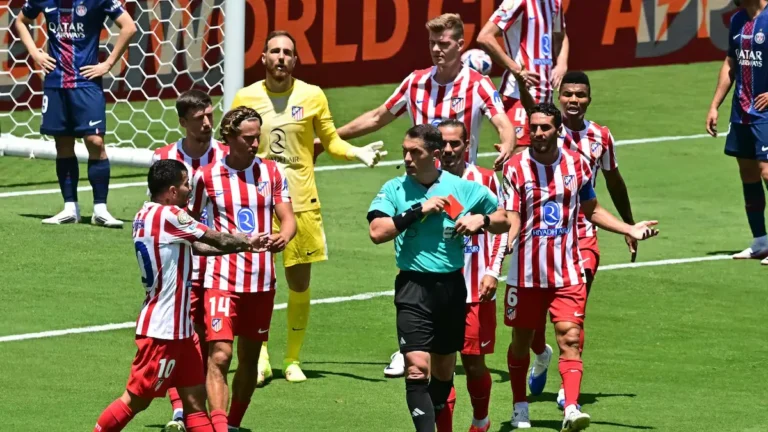Atlético Madrid: Ceballos Avoids Red Card
Atlético Madrid finds itself in a state of disbelief following an incident during their recent derby against Real Madrid, where Dani Ceballos of Real Madrid made a dangerous challenge on Atlético’s midfielder, Barrios. Despite the nature of the tackle, the referee, Soto Grado, did not show a red card, and VAR did not intervene to review the decision. This has raised questions about the consistency of refereeing standards in such high-stakes matches and the potential influence of external pressures on refereeing decisions.
Table of Contents
The Incident That Shocked Atlético Madrid
In the 24th minute of the match at the Santiago Bernabéu, Barrios was chasing a loose ball in the middle of the field when he was met by a reckless and forceful tackle from Ceballos, which struck his leg and caused Barrios to fall to the ground in visible pain. Ceballos’ challenge was clear and dangerous, yet referee Soto Grado did not issue a red card. Additionally, no one from the VAR room—headed by De Burgos Bengoetxea—called for a review of the play, despite many analysts and former referees agreeing that it was a clear red card offense.
This decision left Atlético Madrid feeling perplexed, especially given the strict scrutiny applied to similar incidents in the past. In a similar case involving Kylian Mbappé, Real Madrid’s actions had sparked a media storm and strong calls for discipline. In this situation, however, the Madrid side appeared to have benefited from what many saw as an obvious error.
Atlético Madrid’s Official Stance
Despite the evident frustration within the club, Atlético Madrid officially supported the referees’ decisions. Coach Diego Simeone refrained from criticizing the referee after the match but mentioned that the incident could have been reviewed by VAR. This is a clear indication of Atlético’s commitment to maintaining a stance of support for officials, even though internally, there were concerns about the fairness of the decision.
The Pressure on the Referee
While Atlético Madrid maintains an official position of supporting the referees, there is an underlying acknowledgment that the referee, Soto Grado, was under significant pressure throughout the week leading up to the match. Real Madrid’s media and public pressure after the Mbappé incident seemed to weigh heavily on the minds of those involved in the officiating process. In high-profile derbies like this one, where every decision is scrutinized, it is challenging for referees to maintain the necessary independence and composure.
The scrutiny and external pressures on Soto Grado in this particular match likely played a role in the hesitancy to issue a red card. The fear of making a controversial decision in such a high-profile game could have led to a reluctance to take action against a key player for the home side, potentially altering the flow of the match.
The Similar Incident with Mbappé: A Contrast in Reactions
What stands out about this situation is the stark contrast in the reactions to similar incidents. In a previous match, a tackle on Paris Saint-Germain’s star, Kylian Mbappé, by a Real Madrid player led to an uproar from the Madrid media and fanbase, calling for strict punishment for the offending player. This reaction prompted widespread media coverage and a concerted push for disciplinary action.
However, in this latest incident against Atlético Madrid, the media and fan response from Real Madrid has been markedly different. Real Madrid appears to have benefited from a non-decision, with no severe consequences for Ceballos despite the clear nature of his challenge. This inconsistency in how similar situations are handled by the media and officials has raised questions about fairness and the standards applied to different teams. Is there a bias in how these situations are judged, depending on the team involved?
The Impact of Refereeing Under Pressure
One of the major concerns arising from this incident is the significant impact that external pressure can have on refereeing decisions, particularly in high-stakes matches like a derby. Referees are expected to make objective, clear decisions, but the constant media scrutiny and the weight of public opinion can influence their judgment.
The pressure on Soto Grado during this match was undoubtedly immense, and the consequences of making a controversial decision were high. As a result, it is possible that the referee felt reluctant to issue a red card against Ceballos, knowing the potential backlash that could follow. The psychological toll that such pressures place on referees is not to be underestimated, and it highlights the complexities involved in officiating at the highest level of football.
The Lack of a Red Card and Its Consequences on the Match
The lack of a red card for Ceballos was not just an isolated incident; it had a tangible impact on the match itself. Had Ceballos been sent off in the 24th minute, Real Madrid would have been reduced to 10 men early in the game, significantly altering the dynamics of the match. Atlético Madrid would have gained a numerical advantage, which could have been crucial in a derby that is often decided by fine margins.
Instead, Real Madrid played the entire match with a full complement of players, allowing them to retain their tactical approach and press forward in the second half. The lack of a red card meant that the game continued without disruption, and the final result, a 1-1 draw, was seen by many as a reflection of the balance between the two teams. However, had Ceballos been sent off, the course of the match could have been quite different, with Atlético Madrid potentially taking advantage of their numerical superiority.
The Reactions from Both Fanbases
As expected, the reactions from the fanbases of both clubs were vastly different. Atlético Madrid fans were outraged by the referee’s decision, viewing it as a clear error that deprived their team of a fair opportunity. Real Madrid fans, on the other hand, felt that the decision was correct, given the circumstances. The contrasting opinions from both sets of fans highlight the emotional investment that supporters have in these high-stakes matches.
These differing reactions are part of the reality of modern football, where decisions are often interpreted through the lens of team loyalty. What one group sees as a mistake, another views as a fair call. This dynamic adds to the complexity of discussing refereeing decisions, particularly in the aftermath of a contentious match.
What Happens Next?
The incident involving Ceballos will not be quickly forgotten by Atlético Madrid fans. While the match itself has passed, the controversy surrounding the non-decision will linger in the minds of supporters. It is likely that the conversation around this particular incident will continue for some time, especially as the media and fans continue to analyze the event and its implications.
For the refereeing community, the incident raises important questions about how to handle similar situations in the future. Should VAR be more consistently used to review potential red card offenses, especially in high-profile matches? How can referees be better supported to make clear and confident decisions without the fear of external pressure? These are questions that will need to be addressed moving forward, as the integrity of the game depends on fair and consistent officiating.
- Will the Same Outrage Be Seen? One of the most intriguing questions arising from this incident is whether the same level of outrage will be seen from the media and fans in the case of Ceballos’ challenge as was seen with the Mbappé incident. Given the similar nature of both tackles, many are wondering whether those who criticized the earlier challenge will now call for similar action in this case. The answer to this question will provide further insight into how the footballing world perceives fairness and consistency in decision-making.
Conclusion
The incident during the Atlético Madrid vs. Real Madrid derby has brought to light the challenges and complexities of refereeing in high-profile matches. While Atlético Madrid has publicly supported the referee’s decisions, the internal reaction reveals a sense of disbelief at the non-decision. The pressure faced by referees in such matches, combined with the contrasting reactions to similar incidents, underscores the need for greater consistency and transparency in decision-making. Moving forward, it is crucial that referees are empowered to make fair and impartial decisions, ensuring that the integrity of the game is upheld. The outcome of this incident will undoubtedly continue to shape the conversation around refereeing and VAR in the future.
Have you ever read an article like this?
There are no reviews yet. Be the first one to write one.






